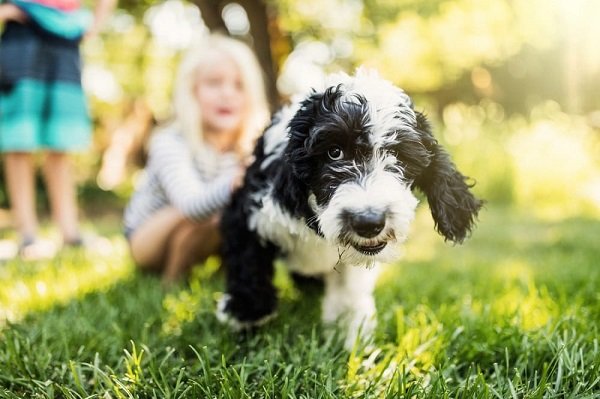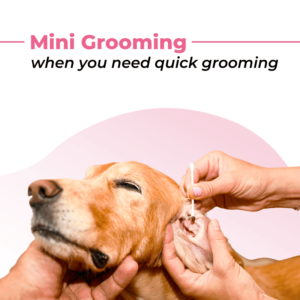
Home » Are Sheepadoodles Aggressive? Scientific Evidence & Facts
Sheepadoodles are not aggressive. But this breed displays some reserve regarding strangers, being less friendly and more untrusting than other breeds. Despite this, you can socialize and train Sheepadoodles from an early age to avoid aggression. In this blog post, we will look at the scientific evidence surrounding the aggression of sheepadoodles. We will also look at ways you can keep your Sheepadoodles safe and happy.
1) Sheepadoodles Temperament
2) Danger/Threat
3) With Family & Kids
4) With Other Pets
Sheepadoodles mix two breeds known for their gentle and loving nature – the Old English sheepdog and the Standard Poodle.
They are known for their friendly and affectionate temperament, making them great family pets. It is essential to understand that aggression is a behavior, not a breed trait.
Various factors, including fear, territoriality, lack of socialization, and genetics, can cause aggression.
Exposure to different people, animals, and environments from a young age is essential to ensure they develop into well-behaved dogs.
Additionally, providing them with regular exercise and mental stimulation can help prevent any unwanted behavior.
If a Sheepadoodle feels threatened or uncomfortable, it may display aggressive behavior. It can include growling, barking, snarling, biting, or lunging. It’s important to note that aggressive behavior should not be ignored or dismissed, as it can harm humans and other animals.
If you suspect that your Sheepadoodle is displaying aggressive behavior, it’s essential to seek the help of a professional dog trainer or behaviorist to address the issue.

Sheepadoodles are also great with kids. They are patient, protective, and playful, making them excellent companions for children of all ages. They are instinctive to protect their loved ones, making them a perfect choice for families looking for a loyal and trustworthy companion.
However, it is essential to note that, like any other breed, Sheepadoodles should always be supervised around young children to ensure their safety. Moreover, guide the children to behave appropriately with their furry friends to avoid unwanted situations.
In general, Sheepadoodles tend to do well with other dogs, especially if they are socialized from a young age. They enjoy playing and running around with other dogs and usually do not display any aggressive behavior toward them.
However, socialization is critical when introducing a Sheepadoodle to other animals, as these dogs have hunting instincts and try to chase pets and rodents in the park. Introducing them slowly and under supervision is essential, especially if the other pet is smaller or timider.
A stressful environment is one of the most significant factors that can contribute to aggression in Sheepadoodles. Dogs exposed to too much noise, chaos, and tension may become anxious and aggressive.
For example, if a Sheepadoodle is left alone for an extended period, it may become stressed and anxious, leading to destructive behavior and aggression.
Dogs that are afraid may become aggressive as a defense mechanism. For instance, if a Sheepadoodle is scared of a particular person or situation, it may react aggressively to protect itself.
It is essential to identify the source of fear and address it accordingly to prevent aggression from occurring.
Dogs that are in pain may become irritable and aggressive. Rabies is a viral disease that causes aggression and fear in dogs.
Therefore, monitoring a Sheepadoodle’s health and seeking veterinary care to prevent pain-related aggression is crucial.
Numerous reasons can contribute to why a Sheepadoodle may become aggressive in new situations. Some primary reasons are a lack of socialization, residual fear from puppyhood, mistrust of new people, and prior traumatic experiences.
A study found that dogs placed in new situations were more likely to be aggressive than those not. The study also found that the dogs that were not given enough time to adjust to new environments were more likely to be aggressive.
It is widely believed that aggression in sheep doodles is caused by a lack of attention from their owners.
They may become frustrated and aggressive if you do not give your Sheepadoodle the necessary attention. Working with a professional behaviorist or trainer is essential to help your dog overcome their inattention and mistrust.

Sheepadoodles are typically known for their friendly and affectionate personalities, but like any breed, they can display signs of aggression. Owners must recognize these signs early to prevent potential harm to themselves or others.
One common sign of aggression in Sheepadoodles is growling or snarling. It can be a warning sign that your dog feels threatened or uncomfortable in a specific situation.
Another sign is baring teeth, often accompanied by growling or snarling. It’s important to note that these behaviors may not always be a sign of aggression and can also be a sign of fear or anxiety.
If the Sheepadoodle’s body is stiff and its hackles are raised, they are likely to feel aggressive and may attack if they feel threatened.
If the Sheepadoodle is lunging toward you or another animal, they feel aggressive and may bite or attack.
Biting is the most direct form of aggression and should be treated cautiously. If the Sheepadoodle is biting, they are feeling extreme aggression.
It’s essential to assess the situation and understand why your dog displays these behaviors before assuming it’s aggression.
Knowing how to manage an aggressive dog safely is essential, as aggression is one of the dogs’ most common behavior problems. Aggression can lead to severe injury or even death if not appropriately managed.
There are several things you can do to manage an aggressive dog safely. Understand the root cause of the aggression. Is the dog aggressive because it’s afraid or in pain?
First, you need to identify the triggers for the aggression. Once you know what is causing the aggression, you can work on management and training to help the dog stay calm and relaxed.
Second, you need to know how to read dog body language. It will allow you to see when the dog is starting to get agitated, and you can take steps to diffuse the situation before it gets out of hand.
Do not punish the dog for being aggressive. It will only make the problem worse.
Do not try to force the dog to do anything physically. It could provoke an attack. It is essential to have a sound support system in place.

Even though Sheepadoodles are bred to be gentle, family-friendly companions, they can sometimes exhibit aggression. However, this behavior can be managed and even prevented with the proper training.
It is generally accepted that a lack of socialization causes aggression in Sheepadoodles. It is when the dog does not have enough contact with people and other animals, and as a result, they become aggressive, and it can be due to several factors, such as the owner needing to spend more time with the dog or being kept in an isolated area. Several factors can contribute to this, including:
You should also provide them with plenty of exercise and mental stimulation. According to K9 Rocks, boredom and pent-up energy are often the root cause of dog aggression.
If you start training your Sheepadoodle early and provide them with plenty of socialization and exercise, you can help prevent aggression.
Many experts believe responsible breeding and genetics are the main factors preventing Sheepadoodle aggression. Other possible factors, such as environment and socialization, play a role, but genetics is considered the most important.
Some Sheepadoodles are more prone to aggression than others due to their genes and temperament. It is valid as responsible breeders typically only breed from calm, well-adjusted parents. If you are considering getting a Sheepadoodle, research and find a reputable breeder committed to producing healthy, well-tempered dogs.
Herding instinct is the most likely reason why Sheepadoodles bite so much. Sheepadoodles are bred from herding dogs, and their instinct is to herd. It can manifest in nipping at people’s heels or chasing after moving objects. Biting could also be due to genetic factors, lack of training, and early socialization. This behavior is annoying or even painful if the Sheepadoodle bites too hard. If you have a Sheepadoodle, training them properly to avoid this behavior.



